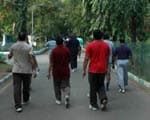People with irritable bowel syndrome (IBS) may be able to find some relief by getting regular exercise.

The exact cause of IBS is unknown, but people with the condition often find that they have certain symptom triggers, such as particular foods, larger-than-normal meals or emotional stress. The typical treatment includes diet changes, as well as anti-diarrhoeal medication and, for constipation, laxatives or fibre supplements. There's also some evidence that behavioural therapy and stress-reduction tactics help some people.
It is different from inflammatory bowel disease, which includes two digestive diseases - ulcerative colitis and Crohn's disease - that are believed to involve an abnormal immune system reaction in the intestines.
Exercise may be helpful for several reasons. Past studies have shown that it can get things moving along in the gut, relieving gas and constipation. Vigorous exercise, however, may worsen bouts of diarrhoea. Regular exercise may also have a positive influence on the nervous and hormonal systems that act on the digestive tract.
Researchers studied 102 adults of America with the disorder. None of the participants were regularly active at the outset. The researchers randomly asked about half to begin exercising over a 12 weeks period, with advice from a physical therapist (20 to 60 minutes of moderate-to-vigorous exercise - like brisk walking or biking - on three to five days out of the week). The rest stuck with their normal lifestyle habits. At the end of the study, the exercise group reported greater improvements on a standard questionnaire on IBS symptoms. They were also less likely to show worsening symptoms. Of the exercise group, 8 percent had a clinically significant increase in IBS symptoms, versus 23 percent of the comparison group. That suggests that for a considerable number of people remaining sedentary may only worsen IBS.
It was found that that those who were told to get some more exercise had better odds of seeing improvements in problems like cramps, bloating, constipation and diarrhoea. After three months, 43 percent of the exercisers showed a clinically significant improvement in their symptoms - meaning it was making a difference in their daily lives. For people who are currently less-than-active, even a moderate increase in exercise may curb irritable bowel symptoms, the researchers recommend.
DoctorNDTV is the one stop site for all your health needs providing the most credible health information, health news and tips with expert advice on healthy living, diet plans, informative videos etc. You can get the most relevant and accurate info you need about health problems like diabetes, cancer, pregnancy, HIV and AIDS, weight loss and many other lifestyle diseases. We have a panel of over 350 experts who help us develop content by giving their valuable inputs and bringing to us the latest in the world of healthcare.












